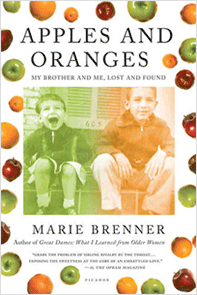 Recently at New York's Museum of Jewish Heritage, I was interviewed by ABC's Magee Hickey but within moments, the entire audience was participating about their own complicated brother sister issues. I am no longer surprised by this. This is a time in America when we are trying to grapple with the financial meltdown. We are in a crisis and trying desperately to come together with our families. Often confusion and misunderstanding stops many of us.
Recently at New York's Museum of Jewish Heritage, I was interviewed by ABC's Magee Hickey but within moments, the entire audience was participating about their own complicated brother sister issues. I am no longer surprised by this. This is a time in America when we are trying to grapple with the financial meltdown. We are in a crisis and trying desperately to come together with our families. Often confusion and misunderstanding stops many of us.Are we still on the playground? Sometimes it can feel that way --- at least it did to me.
The question I am most often asked is: How do two people who grow up in the same house become strangers in later life?
There are no easy answers to this question.
For years, I believed my own situation was uncommon. I often changed the subject quickly when asked if I had a brother. Yes, I would say. "We speak once a week." We were such opposites our mother had a name for us: Apples and Oranges.
You could have put our conversations on an egg timer.
My brother Carl and I struggled for years to become a team. He was an arch-conservative trial lawyer turned apple orchardist. I am a writer who lives in New York with friends my brother called "ACLU libs."
I wish I were kidding about this.
We learned we had a deep and abiding need to connect with one another.
"Why does no one talk about the importance of sibling relationships?" I was asked this week.
"I don't even know where to begin," another woman said.
There is startling new research which shows that the big hole in the lives of so many of us is this sibling "thing."
Now there are therapists who have adult sibling therapy weekends --- a first.
"What is new in the research?" I am often asked.
We see our reactions to our own siblings in our children's lives and for many of us, in how we react to our own partners, colleagues and friends. Are we distant? Loving? Quick to overreact? Is this a sibling trigger?
The statistics are startling.
52% of all of us with "challenged" relationships struggle to a place of new understanding.
This is an urgent topic for many of us. What we are talking about is the relationship which vexed my own life --- the tangled fishing line of brother sister love which defined my brother and me.
It was a fierce attachment --- the phrase Vivian Gornick used describing her life with her mother. The ferocity masked the deep yearning to connect…
---Marie Brenner






